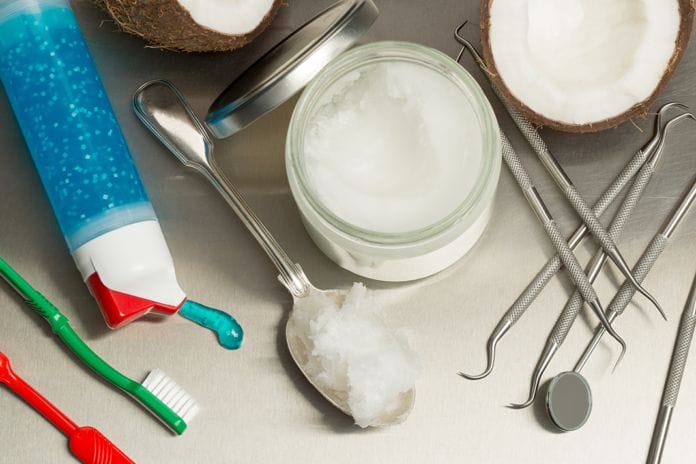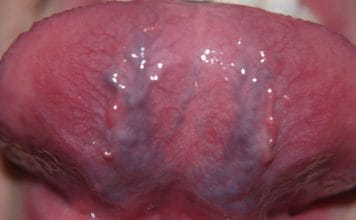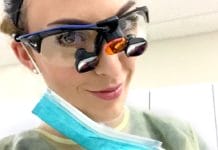I have recently been asked my professional opinion on “coconut oil pulling” by numerous patients. Although unfamiliar with this technique, I was curious about its benefits to dental health.
What is “Oil Pulling?”
Oil pulling is an ancient and traditional technique that is practiced in Southeast Asia and India. The remedy claims to remove bacterial toxins, mostly Streptococcus mutans, which are responsible for oral disease and cavities. The technique is not limited to only coconut oil, but other natural resources, such as sunflower and sesame oil, to name a few.
The information instructs the user to swish with the oil up to four times a day for one to five minutes, totaling twenty minutes per day. It is said, this should effectively break through biofilm (aka. plaque) and reach the underlying bacteria on the tooth surface. The enzymes in the oil are believed to break down the bacteria residing in the oral cavity.
Oil Pulling Therapy
Oil pulling therapy is a traditional practice used as an alternative to brushing by patients that have mouth ulcers, fever, vomiting, persistent cough, thirst and other ailments that may affect daily brushing. The literature stated that tooth brushing would be contra-indicated in these cases; therefore, oil pulling would benefit the oral cavity by reducing the bacterial mutans. It is a widely used practice in Asia and African countries as a primary means of health care, as well as, other traditional herbal remedies.
Oil Pulling Effectiveness
The most recent studies conducted were to determine the effectiveness of oil pulling in comparison to newer and more conventional recommendation in the dental field. Both studies were facilitated under a controlled setting, comparing the use of sesame oil to chlorhexidine mouth rinse. Although both techniques did show a positive reduction in bacteria in the oral cavity, the chlorhexidine was more effective and showed bacterial reduction earlier in the study than did the sesame oil. Furthermore, the studies did not address all dental factors to be conclusive and were not time sensitive studies. Therefore, the American Dental Association (ADA) does not recommend or approve oil pulling as a daily oral hygiene regimen. Alternative treatments, such as oil pulling, need to be implemented with knowledge and skill to be effective in its daily use.
The majority of my patients who have inquired about oil pulling are most interested in its nature-based quality and its lack of chemicals. Based on the research I have studied, and which the ADA has approved, over-the-counter bacterial rinses are a better alternative to time-consuming oil pulling. Further, over-the-counter rinses have evidence-based research to substantiate their natural antibacterial properties, like using essential oils as the main ingredient. Although the studies showed that chlorhexidine, also an ADA approved product, is effective, it does have negative properties, such as its chemical base, medicinal taste, and staining with continued use.
In my opinion, as a practicing dental hygienist for seventeen years, tooth brushing at least two times a day for two minutes, and cleaning interdentally using a proper technique one time per day, are effective approaches to maintaining good oral health. The difficulties of patient compliance with the recommendation of just cleaning interdentally once per day, as compared to recommending a patient to rinse for 20 minutes per day, is an unrealistic expectation. This, especially given the effectiveness of natural-based, over-the-counter ADA approved rinses, are less time consuming and research validates their antibacterial quality.
SEE ALSO: Oil Pulling: Should Dental Hygienists Recommend It?
DON’T MISS: Separating Fact from Fiction in Regards to Oil Pulling
References
Asokans S., Emmadi P., Chamundeswari R. Effect of oil pulling on plaque induced gingivitis: A randomized controlled triple-blind study. Indian J. Dent. Res. 2009; Jan March 20: 47-51. Retrieved from https://www.ncbi.nlm.nih.gov/pubmed/19336860.
Asokan S., Rathan J Muthums, Rathna PV, Emmadi P., Raghuraman, Chamundeswan. Effect of oil pulling on Streptococcus mutans count in plaque and saliva using Dentocult SM strep mutans test: A randomized controlled, triple-blind study. J. Indian Suc, Pedod. Prev. Dent. 2008; March 26: 12-7. Retrieved from https://www.ncbi,nlm.nih.gov/pubmed/18408265.
ADA link, for further information: http://www.mouthhealthy.org/en/az-topics/o/oil-pulling.














